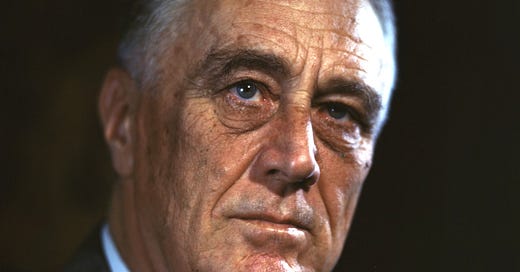In the summer of 1942 Franklin Roosevelt warned Adolf Hitler about the consequences of what would come to be called the Holocaust. Writing to a rally at Madison Square Garden on behalf of European Jews, Roosevelt said, “Citizens, regardless of religious allegiance, will share in the sorrow of our Jewish fellow citizens over the savagery of the Nazis against their helpless victims.” Americans would do more than sympathize. "The Nazis will not succeed in exterminating their victims any more than they will succeed in enslaving mankind. The American people not only sympathize with all victims of Nazi crimes but will hold the perpetrators of these crimes to strict accountability in a day of reckoning which will surely come.”
Roosevelt repeatedly warned the Nazis about the justice that awaited them. "The time will come when they shall have to stand in courts of law in the very countries which they are now oppressing and answer for their acts.”
Jewish leaders wanted more than words from Roosevelt. Rabbi Stephen Wise, head of the American Jewish Congress, met with the president at the White House. "Unless action is taken immediately, the Jews of Hitler Europe are doomed,” Wise said.
In the summer of 1943, Roosevelt invited a member of the Polish resistance who had witnessed the operation of the Nazi extermination program to the White House. Jan Karski, a Catholic, told the president that if the Allies didn't stop Hitler, the Jews of Poland would "cease to exist."
Roosevelt responded, "Tell your nation we shall win the war.”
Henry Morgenthau wasn't satisfied. Morgenthau was secretary of the Treasury and a member of a distinguished American Jewish family. At the beginning of 1944 he brought Roosevelt a report on the appalling progress of the Nazi extermination program. "One of the greatest crimes in history, the slaughter of the Jewish people in Europe, is continuing unabated,” the report said. At Morgenthau's urging, Roosevelt approved creation of a special board tasked with taking “all measures within its power to rescue the victims of enemy oppression who are in imminent danger of death and otherwise to afford such victims all possible relief and assistance consistent with the successful prosecution of the war."
Roosevelt followed up with a blistering condemnation of Hitler's policies. “In one of the blackest crimes of all history, begun by the Nazis in the day of peace and multiplied by them 100 times in time of war, the wholesale systematic murder of the Jews of Europe goes on unabated every hour," he said. He went on to say that the United States would use “all means at its command” to save the lives of Hitler's intended victims, "insofar as the necessity of military operations permits.”
Roosevelt's proviso was crucial for the way things turned out. Morgenthau and others advocating direct military action against the death camps were often unspecific about what that should consist of. Bombing the camps? That would kill the very people the action was supposed to save. Bombing rail lines leading to the camps? This was possible but difficult, as Roosevelt's military advisers made clear. In those days of unguided bombs, many sorties might be required to take out a single rail line, which could be repaired within hours. Each bomber that flew against a rail line was one less bomber to attack a German military target.
Targeting the camps or the rail lines might prolong the war. This was something Roosevelt was not willing to do. Besides, the camps and the rail lines weren't necessary for the Nazi murder program. Nazi soldiers could simply machine-gun Jews wherever they were rounded up.
Roosevelt concluded that the fastest and surest way to halt the killing of the Jews was to defeat the Nazis. This was the policy he pursued, and he seems never to have second-guessed himself.
Roosevelt died before the first American troops reached the death camps. The soldiers were shocked by what they saw. Their officers were shocked. Roosevelt certainly would have been shocked.
In the years after the war Roosevelt was criticized for not having done more to save the Jews. Many of the critics had lost relatives in the Holocaust. Their criticism was understandable from an emotional standpoint even if it didn't answer the objections of Roosevelt's military advisers.
Had Roosevelt lived, would he have wished he had done more? Only if he thought he could have done so effectively and without prolonging Hitler's evil rule. Little evidence surfaced after the war that called into serious question Roosevelt's analysis of the situation.




I teach 10th grade English and we are reading Elie Wiesel's NIGHT, and also read his "Perils of Indifference" speech, in which he criticizes FDR's decision to turn back the ship The St. Louis, with 1,000 Jews aboard in1933. My students asked me why he did that, and I tried to explain about quotas, and fear of spies, and such, but I feel like my answer is inadequate. Was there a compelling reason to refuse to admit the refugees? Or in hindsight, would you see that decision as a mistake? I would appreciate your insight to share with them.